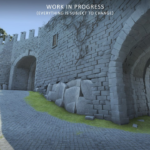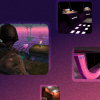
The world of video games has long been crowded. Even the industry’s most “boring” years have seen so many new products come out that it is challenging to keep track of everything yet even play it. Miss something potentially interesting is relatively easy. CS.MONEY Blog launches “How Did I Miss That?!”, a brand new series to tell you about the most unusual and exceptional projects that deserve some of your attention.
And today we will talk about Big Bad Wolf’s The Council. Why did it remain in the backyard of the gaming industry’s history? It’s complex: the developers themselves are to blame, the release format has been influential, and surely low reviews did a job. But let’s take it step by step.
The Council is not about gameplay

Initially, the game was often compared to TellTale’s projects, which managed to go bankrupt and was resurrected afterward. Primarily because of the distribution model. The Council is divided into five episodes, and the first one is available on Steam for free. This was meant to appeal to players who are afraid of wasting their money and want to try it before checking out. However, this trick did not fully work. After all, the episodes did not come out all at once yet with a sufficiently large interval. The first part was released on Steam on March 13, 2018, the second on May 15, and the last one only on December 4 of the same year. During this time, even those who were really hooked by the first episode managed to lose interest in the game. Netflix’s notorious series release format could work here, but what’s done is done.
But it’s not only the format that birth such comparisons. From the very first minutes of The Council, its gameplay begins to resemble a usual interactive movie, hinting that you won’t have to do anything, just sit there and enjoy the story prepared by the writers. But in the nick of time, this impression passes. The game suddenly shows the player a relatively well-developed role-playing system. There are three paths of character development to not only affect his capabilities within the game and seriously change the plot. Even at the very beginning, you might not have enough skill points to solve the key puzzle or a dialogue option. The developers quite clearly make it clear that if you are a Diplomat, don’t try to get into conversations about religion. And you lack linguistics knowledge.


But there’s always room for more. All the information in the game, whether it’s a note, an item, or even a random NPC phrase, can help you in the so-called “Confrontations,” a special system of verbal combats in The Council. During the Confrontations, you can find new details that will help move the plot in the direction you want if you can convince your opponent. But if you fail, NPCs turn against you, finding you too weak or stupid to seriously affect your future relationships.
Dialogues themselves are brilliant. Each character feels not just like another enemy or ally but like someone who wants to be observed to unveil their secrets.

Atmosphere and style are too attractive
Although not an AAA project, The Council tempts almost immediately with its style and atmosphere. The scenery and costumes of the late 18th century, coupled with hypertrophied facial features, please the eyes. And the mysterious fog enveloping the events from the beginning dramatically enhances this effect. And even if the game has nothing to do with Lovecraft’s works, this is probably the first analogy that comes to mind.
All the characters in The Council look nice and are easy to remember. There are original NPCs and historical figures, such as Napoleon Bonaparte, a young and unknown French officer, and the first US President, George Washington.

The voice acting is also quite pleasant, although one can see a lack of budget. The main character periodically forgets to show emotions where they clearly should be. You can feel it precisely towards the end of the game when the passion and emotions peak. Ultimately, this does not spoil the impression of the game, yet a bittertaste remains. Well, it could have been done better!
And, speaking of the atmosphere, it’s worth mentioning locations and interior design. Here, it’s not that great either. Most likely you won’t remember more than 15 unique places through the whole game, which happens inside such a huge, seemingly, castle. And they won’t let you walk around the island too much, only the pier, where you start the game. Even though everything is decorated, to be honest beautifully, it’s a little sparsely. Yes, and endless loading screens during between locations towards the end of the story gets really annoying.

Ambiguous plot
You play as a young French aristocrat, Louis de Richet, whose mother, the head of the Golden Order in France, has disappeared on the island of the mysterious Lord Mortimer. Accordingly, your main goal will be to find her while also solving more and more mysteries with time.
In fact, the entire first episode sets up the exposition. Players get acquainted with all the characters and even make several important decisions, with consequences, however, to be revealed only in the following parts and will not always be as global as it might seem. And some findings, on the contrary, will surprise.

Everything will start spinning quickly and dynamically. The tempo will get so high that you literally will want to go through the game in a single session without being distracted. Up to the third part, the game intrigues greatly. It’s unimaginable how this studio made it without any serious projects before. But since the beginning of the fourth episode, everything becomes pretty straightforward, and the last chapter only dots the i’s.
Here comes the central claim of all critics and dissatisfied players. The End. It outraged most of the gaming community (of those who generally followed the project) and became, perhaps, the main reason why interest in The Council faded so quickly after the release of the last episode.
What’s wrong? Avoiding spoilers, many considered it too simple. That’s no wonder. Indeed, in the first episodes, the developers raised the bar of expectations too high. But this, in our opinion, does not make the ending itself bad.

Of course, if you’re expecting a pure detective story without cults and magic, just pass by and don’t waste your time on The Council. But if you are not embarrassed by it and are ready for other disadvantages of the game mentioned above, this project is definitely worth time and money.
CS.MONEY Blog Rate: 7 Golden Orders of 10.












